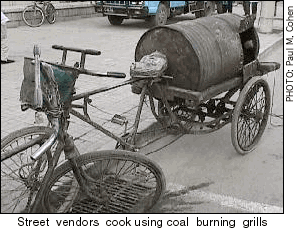
Air Pollution Chokes Beijing
by Hu Pan
 |
by Hu Pan |
|
 (ENS) BEIJING --
As
the October 1st 50th anniversary of National
Liberation Day approaches, more than 5,000 construction projects are underway to prepare for the
massive celebrations. As a result, there is now a rapid resurgence of air pollution in Beijing.
(ENS) BEIJING --
As
the October 1st 50th anniversary of National
Liberation Day approaches, more than 5,000 construction projects are underway to prepare for the
massive celebrations. As a result, there is now a rapid resurgence of air pollution in Beijing.
Over the first five months of 1999, the air pollution situation in the Chinese capital city of Beijing had been steadily improving. Initially, sulfur dioxide levels decreased by around 20 percent, and by May, the sulfur dioxide index of the air reached its lowest point in fifteen years. This remarkable reduction of air pollution was the result of government reaction -- at the end of 1998, 46 emergency policies had been put into effect. More than a year ago, the Chinese Environmental Bureau admitted that Beijing had not only become the smoggiest city in China, but that at certain times, the levels of polluting air exceeded that of even Mexico City, which was well established as the world's dirtiest city. Although the total pollution index of Beijing was lower than that of Mexico City, the widespread burning of coal during winter made Beijing's winter pollution higher by 20 to 30 percent. Due to the economic interests of many people, it is impossible for the Beijing government to stop the construction of new buildings. On top of that, the 5,000 new construction projects are proceeding, night and day, to prepare for the 50th anniversary celebration of National Liberation. Largely because of the sheer number of buildings under construction, the density of dust particles in Beijing's air is greater than that of the other cities. Beijing's air is now 26 times dustier than that of Paris, six times dustier than that of Berlin and Tokyo, and one-third dustier than that of even Mexico City. Studies revealed that respiratory illness had become a top killer of Beijing residents. Along Wangfujing Street at the commercial center of Beijing, trees only fifteen years old were cut down because the pollution had destroyed them. |
|
At
the beginning of 1999, the Beijing city government started to make daily air quality reports to the
public. Some of the most polluting factories in the area were forced to reduce their production.
The famous Capital Steel factory, one of the largest and oldest of its kind in the country which is located on the outskirts of metropolitan Beijing, was compelled to give up its yearly goal of 10 million tons of steel. This factory was ordered to allot 130 million yuan out of its annual profit of 350 million for pollution treatment. Bi Qun, the factory president, said, "The figure that must be appropriated for pollution treatment will soon go up to 210 million yuan." Besides the Capital Steel factory, there is a special steel producing plant within Beijing itself which has an annual profit of 100 million yuan. Because of this factory's location and the pollution it emitted, it has been closed down completely. In a related development, some 6,000 commercial food grills on the streets were banned. The local government, attempting to reduce sulfur levels, has forced citizens to use coal which would produce low levels of sulfur. Some 29,000 tea-making stoves on the streets of Beijing received technical assistance to lower the amount of coal used. Despite the improvements which resulted from the government's actions, it is still very difficult to bring back the good old days when people in Beijing could see a clear blue sky. The repercussions have been severe for the sightseeing business on the Central TV Tower. Vice-General Manager Mrs. Zhang says, "Nowadays you can see a nice blue sky only a few times a year. We used to get over 1,000 tourists per day. Now there are usually two or three per day." The two newest sources of pollution in Beijing are building construction and automobile use, both of which have increased rapidly in only a few years. Although Beijing has already banned from use 51,000 overdue vehicles -- including 14,000 cheap taxis -- another government policy backfired. Towards the end of 1998, a law was passed which would deny a driver's license to those who owned vehicles that caused more pollution than normal. So, in the one month before the law went into effect on January 1, 1999, over 100,000 such vehicles were sold. The 1.5 million vehicles in Beijing today not only make the city of 13 million much more crowded, but also blanket the streets with poisonous blue fumes.
Albion Monitor
September 6, 1999 (http://www.monitor.net/monitor) All Rights Reserved. Contact rights@monitor.net for permission to use in any format. |